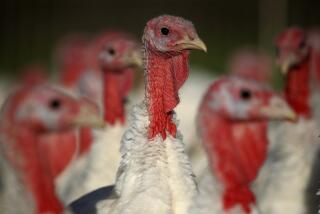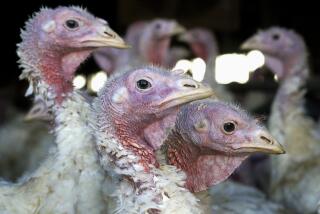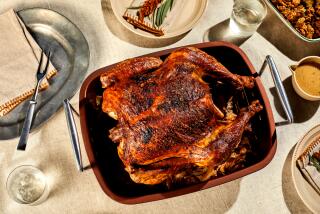What’s added, what can’t be
- Share via
Here are a couple more turkey facts to get your teeth into -- one of them something you don’t need to think about.
You may see some turkeys advertised as “hormone free.”
The Foster Farms website -- to name just one example -- says of its fresh turkey: “You can feel good about serving it to your family as we promise that it will be the freshest available at your store and will never contain added hormones or steroids.”
The Whole Foods Market website also proclaims that its turkeys lack added growth hormones -- and then notes, in small letters, that “federal regulations prohibit the use of hormones in raising pork and poultry.”
So don’t be overly impressed by such claims. It’s been illegal to treat poultry with hormones since the 1950s. “And they were never, ever used in turkeys,” says Francine Bradley, extension poultry specialist in the Animal Science Department at UC Davis.
In short, the only hormones turkeys have are the ones they produce themselves.
Similarly, any claim you may see about a steroid void is another red herring since the use of any steroids in turkey production is also illegal.
Extra ingredients
Some turkeys are injected with a solution intended to make them tastier and juicier.
If this has been done, the package label must say “basted” or “self-basted,” list the ingredients in the solution and tell how much of each was used.
Possible ingredients include salt, partially hydrogenated soy or corn oil, and butter. The weight of the injected solution is included in the weight of the turkey.
Different brands use different solutions, but in general, based on nutrient data from the U.S. Department of Agriculture’s Agricultural Research Service, self-basted turkeys are much saltier and somewhat fattier, although gram for gram they have fewer calories -- and less protein -- because they have more water.
Data comparison
For example, when cooked, self-basted turkey breast with skin has about 18% fewer calories than non-self-basted turkey breast with skin. But it has about 24% less protein, 8% more fat, 13% more saturated fat -- and 650% more salt.
Similarly, self-basted dark meat with skin has about 14% fewer calories than non-self-basted dark meat with skin. But it has about 32% less protein, 21% more fat, 25% more saturated fat -- and 475% more salt.
--
latimes.com
Talking turkey
To read more about turkeys, including how they got so big and whether eating turkey really makes you sleepy, go to latimes.com/health.
Future leftovers
You’ll find recipes, videos and other turkey day features at latimes.com/food. And check out Wednesday’s Food section for a turkey pot pie recipe that’ll set the family gobbling.
More to Read
Eat your way across L.A.
Get our weekly Tasting Notes newsletter for reviews, news and more.
You may occasionally receive promotional content from the Los Angeles Times.








